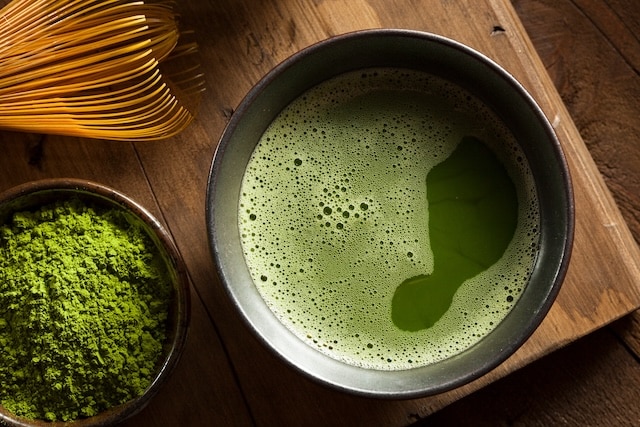Green Tea for Weight Loss: Does Green Tea Help Lose Weight?
Green tea has long been hailed for its numerous health benefits, but one of the most intriguing aspects is its potential to aid in weight loss. In fact, green tea for weight loss is backed by scientific research that highlights its ability to enhance fat burning and boost metabolic rate!
Derived from the Camellia sinensis plant, this widely consumed beverage stands out not only for its rich polyphenol content but also for its capacity to support fat oxidation and improve gut health.
For these reasons, incorporating green tea into your daily routine can be a sustainable and healthy decision that complements an overall balanced lifestyle.
If you’re interested in drinking green tea for weight loss, I recommend the Imozai Organic Green Tea Bags. They offer a balance of high quality and affordability, making them perfect for anyone looking to enjoy the health benefits of green tea without overspending.
Each packet contains potent, organic green tea leaves that deliver great flavor and effective antioxidants like EGCG, known for boosting metabolism and supporting weight loss.
At just $0.09 per bag, this option provides excellent value, allowing you to enjoy a premium tea experience on a budget!
Last update on 2025-07-15 / This article includes affiliate links/Images via Amazon Product Advertising API. I may earn commissions on purchases made through these links.
How Does Green Tea Help Weight Loss?

Without a doubt, green tea is one of the best teas for weight loss.
Green tea’s ability to promote weight loss is supported by several key factors, primarily due to its rich content of polyphenolic compounds, with the most notable being Epigallocatechin Gallate (EGCG).
Green tea promotes weight loss by enhancing the body’s natural fat-burning processes, particularly through the activity of EGCG, which increases thermogenesis, the process of heat production in the body.
This, in turn, accelerates calorie burning and helps reduce body fat over time.
Additionally, green tea is effective for weight loss because EGCG and other bioactive compounds in the tea improve metabolic health by stimulating fat oxidation and increasing the breakdown of stored fat.
These compounds also help regulate blood sugar levels, making it easier to manage cravings and prevent overeating, which further contributes to long-term weight management.
By incorporating green tea into a balanced diet and regular exercise routine, you can harness these powerful benefits to support your weight loss goals.
EGCG & Weight Loss
Epigallocatechin Gallate (EGCG) is a potent antioxidant and a key driver of green tea’s fat-burning capabilities. As an antioxidant, EGCG helps to protect cells from damage, but more importantly, it influences weight loss by enhancing fat oxidation and boosting metabolic rate.
Fat oxidation refers to the process by which fats are broken down and converted into energy. Research, such as a study by Thielecke et al. (2020), suggests that EGCG may promote fat oxidation in overweight individuals, aiding in the reduction of body fat stores.
Additionally, EGCG increases metabolic rate, leading to higher calorie expenditure—a critical factor for those seeking to lose weight (Shixian et al., 2007).
Beyond its direct fat-burning effects, EGCG works synergistically with caffeine, another compound found in green tea. Together, they inhibit the enzyme that breaks down norepinephrine, a hormone that promotes fat breakdown, thereby prolonging fat-burning activity.
Green Tea & Gut Health
Green tea does more than just rev up your metabolism; it also plays a role in improving gut health, which indirectly contributes to weight management. The polyphenols in green tea act similarly to prebiotics, promoting the growth of beneficial bacteria in the gut.
A healthy gut microbiota is crucial for proper digestion, nutrient absorption, and even weight regulation.
When the gut is in balance, it can help manage fat storage and regulate metabolic processes more effectively. Incorporating green tea into your routine could improve your gut health, which may further enhance your weight loss efforts.
Green Tea for Weight Loss: Pros & Cons
As with any dietary strategy, using green tea for weight loss has its benefits and drawbacks.
Pros
- Boosts Metabolism: Green tea, thanks to its high EGCG content, helps increase metabolism, making your body more efficient at burning calories.
- Enhances Gut Health: The polyphenols in green tea support the growth of healthy gut bacteria, contributing to better digestion and overall health.
- Rich in Antioxidants: Besides aiding in weight loss, green tea is packed with antioxidants that protect the body from oxidative stress and support overall well-being.
Cons
- Caffeine Sensitivity: While it contains less caffeine than coffee, green tea still contains enough to cause side effects like jitteriness or sleep disturbances in those sensitive to caffeine.
- Possible Interactions: Green tea may interact with medications like blood thinners or heart medications, so it’s essential to consult a healthcare professional if you’re on medication.
Timing and Dosage: Optimizing Green Tea for Weight Loss
The timing and amount of green tea you consume can significantly affect its weight loss benefits.
Dosage
To maximize the weight loss benefits of green tea, consuming 3-5 cups per day is ideal. This amount provides between 250-500 mg of EGCG, which is sufficient to boost metabolism and fat oxidation.
If you’re fasting or preparing for a workout, 1-2 cups before exercise can be particularly beneficial.
Green Tea Before Meals
Drinking green tea before meals may help curb appetite and prevent overeating. EGCG has been shown to reduce food intake by influencing satiety signals, potentially leading to better portion control (Li et al., 2019).
Green Tea Before Exercise
A cup of green tea before a workout can enhance fat oxidation during exercise, making it an excellent pre-workout beverage. Studies suggest that EGCG increases energy expenditure during physical activity, leading to more effective fat-burning (Hursel et al., 2009).
Green Tea During Fasting
Green tea is a suitable drink during intermittent fasting due to its low calorie content and appetite-suppressing properties. Its polyphenols can help stimulate fat burning while providing a feeling of satiety during fasting windows.
Tips for Adding Green Tea to Your Weight Loss Plan
Maximizing the benefits of green tea goes beyond drinking it at the right time. Here are some practical tips:
- Brew Time: Steep your green tea for 3-5 minutes to release more catechins, ensuring you get the full weight-loss benefits.
- Cold Brew: Try cold brewing green tea overnight. This method can extract a higher concentration of antioxidants with less caffeine, making it a refreshing option.
- Add Spices: Enhance your green tea with metabolism-boosting spices like ginger or cinnamon for added flavor and health benefits.
Alternative Forms of Green Tea for Weight Loss

For those who may not enjoy the taste of traditional green tea, alternative forms like green tea extract or matcha are available.
Green Tea Extract
Green tea extract is a concentrated source of EGCG and can be taken in liquid, powder, or capsule form. Products like RSP AminoLean incorporate green tea extract into their formula, offering an easy way to boost metabolism and aid weight loss.
Last update on 2025-07-15 / This article includes affiliate links/Images via Amazon Product Advertising API. I may earn commissions on purchases made through these links.
Matcha Green Tea
Matcha is a powdered form of green tea that provides a higher concentration of antioxidants, particularly EGCG. Consuming matcha for weight loss is a versatile approach because it can be consumed as a drink or added to smoothies and baked goods.
My favorite Matcha green tea is Matcha DNA:
Last update on 2025-07-15 / This article includes affiliate links/Images via Amazon Product Advertising API. I may earn commissions on purchases made through these links.
Final Thoughts: Is Green Tea Good for Weight Loss?
Green tea is a powerful ally in the pursuit of weight loss. With its ability to boost metabolism, enhance fat oxidation, and support gut health, it can complement a balanced diet and regular exercise.
While not a magic solution, incorporating green tea into your routine could provide that extra boost to help you reach your weight loss goals.
As with any change in diet, it’s essential to listen to your body and consult a healthcare provider if you have any concerns. By using green tea strategically, you can unlock its full potential as part of a healthy, sustainable weight loss plan.
For an affordable yet high-quality option, I recommend Imozai Organic Green Tea Bags. These packets offer a perfect balance of potent, organic green tea leaves and powerful antioxidants like EGCG, known to boost metabolism and aid in weight loss.
At just $0.09 per bag, they deliver exceptional value, giving you the full benefits of green tea without stretching your budget.
Enjoy the flavor and health advantages of a premium tea experience at a fraction of the cost!
Last update on 2025-07-15 / This article includes affiliate links/Images via Amazon Product Advertising API. I may earn commissions on purchases made through these links.
FAQs About Green Tea & Weight Loss
How much green tea should I drink for weight loss?
Consuming 3-5 cups daily is ideal for weight loss, providing 250-500 mg of EGCG.
When is the best time to drink green tea for weight loss?
For optimal results, drink green tea before meals or exercise to enhance fat burning and suppress appetite.
Can I drink green tea every day?
Yes, but monitor your caffeine intake to avoid side effects like insomnia or restlessness.
This website does not provide medical advice. This website site does contain affiliate links, and purchases may earn a commission.
Read my Medical Disclaimer, Review Disclaimer, and Publishing Policies for more details. Use of this site indicates acceptance of these terms.






